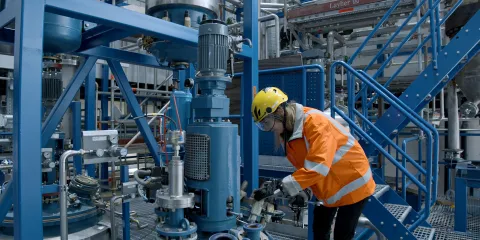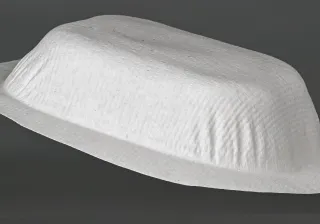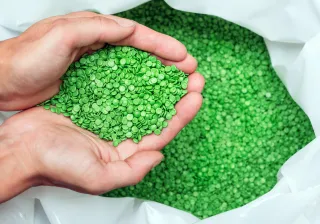Cellulose films and coatings

With tightening regulations on single use and packaging applications, companies need to find alternatives to plastic films. VTT has several modular pilot production lines for perfecting the material and production processes for cellulose films.
Key facts about cellulose films and coatings
Piloting with small amounts of material reduce acceptance risks of new cellulose films
Get expertise in developing cellulose films with qualities comparable or better than plastic films
Find new, economical uses for production side-streams or recycled materials

Providing novel, regenerated cellulose films
The recycling and reuse of plastic films is a major global challenge. It is often hard to separate different plastics from each other, which reduces their recycling rate. That’s why regulation regarding the use of plastics in the EU is tightening. As compostable bio-based materials, cellulose films are a good alternative to cellophane.
To reduce the use of plastic, we need to develop new cellulose films that have similar features to plastic. Novel cellulose films have features, such as moisture resistance, which are not easy to replicate with other bio-based materials.
We can make the transition away from plastics economical by finding new ways to produce the cellulose films cost-efficiently.
Modular pilot lines are efficient tools
Scaling up the production of a biobased material like cellulose film from the laboratory to an industrial level is a challenge. New materials don’t always behave as expected. Either the material itself or the manufacturing process needs to be adjusted.
To perfect the production process of cellulose films, VTT has three modular pilot lines.
Using these pilot lines, we can experiment with materials, speeds, temperatures, and other factors impacting production efficiency. Thanks to the modularity of the pilot lines, we can quickly try out different ways to manufacture the cellulose film.
Ultimately, we can find the most economical and sustainable way of manufacturing a cellulose film with the desired features quickly.

Find new applications for sustainable materials
At VTT, we have the expertise to support you in innovating new uses for your existing cellulose raw materials. You can also find valuable applications for recycling and side streams. For example, the side stream of a food manufacturing process could be used to create the packaging for the food itself.
Our expertise extends beyond the pilot lines. We can carry out studies, benchmarks, analysis, and experiments to optimise the properties of the cellulose film. Our services will reduce your risks and help guarantee financial success.
We are committed to solving the challenges of tomorrow with state-of-the-art technological solutions and bold thinking. Learn more about our cellulose film pilot lines from the videos below and get in touch. Let’s find a solution for reducing the use of plastic in your products and packaging.
Webinar: Sustainable cellulose-based films for food packaging

Our webinar on solutions for single-use plastics is available to watch on demand.

VTT CelluloseFilms – A modular pilot line for cellulose films
The modular pilot line is used to create moisture-resistant cellulose films by dissolving cellulose and regenerating it. Many raw materials from dissolving pulp to alternative pulps and recycled cellulose can be used. The line enables chemical recycling, and no harmful chemicals are needed. This opens new options for making water-resistant and compostable cellulose films and coatings for paper.

SUTCO – A unique surface treatment pilot line for coating
The pilot line is used to innovate cellulose film coatings for beverage, food, or personal hygiene packaging. It can also be used to find solutions for the medical, paper, chemical and fast-food industries.

PLASCO – A tailored polymer piloting line
Our tailorable piloting environment for thermoplastic materials can be used to for example pilot heat sealable fluid packaging, substrate films for electronics, coatings, blend films and recycled films with virgin surface layers.

Read our whitepaper about sustainable packaging

Our whitepaper Sustainable alternatives – in packaging and beyond covers for example how to speed up replacing fossil-based plastics with sustainable alternatives, what kind of results other companies have achieved with piloting, which regulatory changes are driving the transition and how to choose the right piloting house.

Cellulose films and coatings expertise
VTT’s researchers have world-leading expertise in developing and piloting cellulose films.

Dr. Vinay Kumar specializes in processing of cellulose into films and coatings for different applications. His aim is to tackle the plastic waste challenge through forest-derived material solutions that perform like conventional petroleum-based plastics, but are designed for recycling and biodegradation.

Prof Harlin and his group is developing bio-based materials and industrial applications as well as new, sustainable value chains to reduce our dependency on oil and carbon footprint.

Vesa is a research professionaI with special focus on wood-based materials. He drives research and innovation from laboratory scale through products’ testing to final applications to ensure creation of strong customer impact.
Would you like to discuss this service further? Contact us here!
FAQ – Frequently Asked Questions about cellulose films and coatings
What are cellulose films and coatings?
Thin, bio-based layers made from cellulose that can match or exceed the performance of plastic films, ideal for packaging, moisture barriers, and sustainable surfaces.
How does VTT produce these films?
VTT uses modular pilot lines to dissolve cellulose, regenerate films, apply coatings, and test moisture resistance optimising material properties and production speed.
Can the production process be scaled?
Yes. VTT supports everything from lab development to pilot-scale production, using flexible processing lines to scale efficiently and reduce risk.
What applications are supported?
Ideal for packaging (food & hygiene), coatings for paper or board, and industrial uses like barrier materials, electronics substrates, or medical surfaces.
What advantages do cellulose films offer?
They replace single-use plastics, enable compostability, use recycled or side-stream cellulose, resist moisture, and support circular, chemical-free production.
This FAQ is written by AI and checked by a human.
Case: Stora Enso – Brainstorming viable innovations with Impact Hacks
Two successful hackathons, Impact Hacks, produced innovative ideas for future development and helped deepen the collaboration between Stora Enso’s R&D team and VTT’s scientists. The ideas developed have true business potential and several ideas were later developed into projects.
"We wanted ideas that could have a groundbreaking impact in years to come." - Jenny Müller-Wahlman, Director of Group Innovation and R&D, Stora Enso






